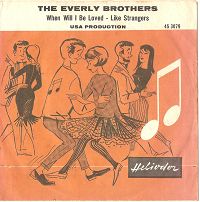A request that this article title be changed to When Will I Be Loved is under discussion . Please do not move this article until the discussion is closed. |
This article needs additional citations for verification .(September 2016) |
| "When Will I Be Loved" | ||||
|---|---|---|---|---|
 | ||||
| Single by The Everly Brothers | ||||
| from the album The Fabulous Style of The Everly Brothers | ||||
| B-side | "Be-Bop-A-Lula" | |||
| Released | May 1960 | |||
| Recorded | February 18, 1960 | |||
| Genre | ||||
| Length | 2:00 | |||
| Label | Cadence | |||
| Songwriter(s) | Phil Everly | |||
| Producer(s) | Wesley Rose | |||
| The Everly Brothers singles chronology | ||||
| ||||
| Official audio | ||||
| "When Will I Be Loved" on YouTube | ||||
"When Will I Be Loved" is a popular song written by Phil Everly of the Everly Brothers, who had a US top-ten hit with it in 1960. Linda Ronstadt covered the song in 1975, and her version was an even bigger hit in the US, peaking at No. 2. Vince Gill also covered it in 1994 on the soundtrack of the film 8 Seconds .
